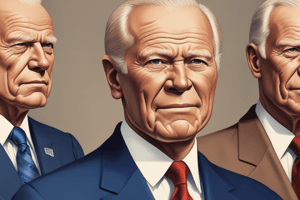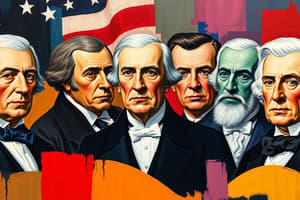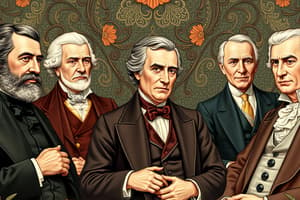Podcast
Questions and Answers
What was the main reason for the decline in manufacturing jobs in the United States during the late 1970s?
What was the main reason for the decline in manufacturing jobs in the United States during the late 1970s?
- Environmental regulations limiting industrial production
- Rise of automation and foreign competition (correct)
- Decrease in consumer demand for American products
- Implementation of stricter labor laws
What was the focus of Jimmy Carter's foreign policy?
What was the focus of Jimmy Carter's foreign policy?
- Maintaining good relations with powerful nations
- Commitment to human rights and social justice (correct)
- Promoting American business interests abroad
- Increasing military aid to allied nations
What was the outcome of the SALT II agreement?
What was the outcome of the SALT II agreement?
- A limit on the number of strategic weapons and nuclear-missile launchers (correct)
- A complete ban on nuclear testing
- A mutual defense pact between the US and USSR
- A significant reduction in nuclear armaments
What was the significance of the Camp David Accords?
What was the significance of the Camp David Accords?
What was the outcome of the Iranian Revolution?
What was the outcome of the Iranian Revolution?
What was the primary reason for the OPEC oil-price increase, leading to a rise in inflation?
What was the primary reason for the OPEC oil-price increase, leading to a rise in inflation?
What was the main purpose of Jimmy Carter's National Energy Act?
What was the main purpose of Jimmy Carter's National Energy Act?
What was the result of Gerald Ford's 'tight money' policy?
What was the result of Gerald Ford's 'tight money' policy?
What was the main theme of Jimmy Carter's 'Malaise' speech?
What was the main theme of Jimmy Carter's 'Malaise' speech?
Which of the following presidents was not elected as either president or vice president?
Which of the following presidents was not elected as either president or vice president?
Flashcards are hidden until you start studying
Study Notes
Gerald Ford (1974-1977)
- First president to not be elected as either president or vice president
- Pardoned Nixon, sparking backlash
Economic Challenges
- Inflation: Ford tried to curb it through a "tight money" policy, cutting government spending and increasing interest rates
- This policy triggered the worst economic recession in 40 years
Ronald Reagan (1981-1989)
- Former California governor who challenged Gerald Ford
- Sworn in shortly after American captives were released
Jimmy Carter (1977-1981) and Energy Crisis
- Promised not to lie during his campaign
- Faced an energy crisis due to OPEC oil-price increase, leading to high gas and heating oil costs
- Believed American reliance on imported oil was a major problem
- Delivered a fireside chat urging Americans to reduce oil and gas consumption
- Signed the National Energy Act, which:
- Taxed gas-guzzling cars
- Removed price controls on US oil and natural gas
- Extended tax credits for alternative energy development
Economic Struggles and Malaise
- Carter's speech on the "crisis of spirit" was seen as a sign of giving up, causing widespread disappointment
- Economic problems stemmed from long-term trends, including:
- Rise of automation and foreign competition reducing manufacturing jobs
- Rapid expansion of the service sector (communications, transportation, retail trade)
Foreign Policy and Human Rights
- Carter rejected the philosophy of realpolitik, instead prioritizing human rights in foreign policy
- Cut off military aid to Argentina and Brazil due to human rights abuses
- Established a Bureau of Human Rights in the State Department
International Relations
- Detente: relaxation of tensions between superpowers
- SALT II: agreement limiting strategic weapons and nuclear-missile launchers, but not reducing armaments
- Afghanistan: Soviet invasion of a neighboring country
- Camp David Accords: 12-day negotiation leading to the first peace agreement with an Arab country (Israel) and recognition of Israel's right to exist
- Ayatollah Khomeini: Muslim religious leader who led the rebellion in Iran, overthrowing the shah and establishing a religious state based on Quranic law
Studying That Suits You
Use AI to generate personalized quizzes and flashcards to suit your learning preferences.




